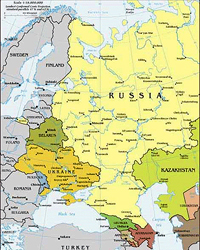Volgograd Terror Attack: Loathing and Loneliness

(RIA Novosti – Natalia Antonova, Acting Editor-in-Chief, The Moscow News – October 22, 2013) Perhaps one of the saddest aspects of the suicide bombing in Volgograd this week assuming we were forced to pick one such aspect is the amount of young people caught up in it.
Among the wounded is a toddler. On top of that, that particular bus route is reportedly popular with students. Many teenagers are showing up on the list of victims.
I’ll leave the detailed analysis of the general security situation in Russia to someone else. Though I must mention that there is already speculation that the terror attack in Volgograd is a “message” to the security services ahead of the Sochi Olympics. After all, Volgograd is also in the south of Russia not that far away from Sochi.
One obviously can’t help but mention the incredible nihilism of such an attack, particularly as far as Russia’s future is concerned. It’s an issue that few Western commentators seem to get, frequently arguing that suicide bombers such as the woman who just blew up the Volgograd bus are fighting for “freedom.” I would say that freedom is the very antithesis of what they’re trying to achieve, and it’s not just due to their fundamentalist mindset.
Their actions are much more than a rejection of the Russian state; they reject the world and the future. The many young victims of the suicide bomber are symbolic of all that.
What’s interesting is that it was initially reported that the alleged suicide bomber, Naida Asiyalova, had been recruited into a terrorist cell by her husband. Then everyone was amazed for a while when it was claimed that it was the other way around Asiyalova had recruited Dmitry Sokolov, now referred to as her “common-law husband” in the Russian press, to join her as a jihadist in Dagestan.
“There is an entire romantic story behind this,” staff at the popular Lenta.ru media outlet joked bitterly on Twitter in response to the news.
A detailed portrait of Asiyalova has yet to emerge. Still, even the few details that the press has currently been fed are interesting. Asiyalova, security services in Dagestan claim, studied alongside Sokolov in Moscow. After she recruited him, the man “dropped everything” to move with her to Dagestan. He took on a Muslim name and was also known by his nickname, Giraffe.
Sokolov’s parents had apparently filed a missing person’s report after their son left, leading the security services to believe that he didn’t tell anyone about his new paramour, nor about his interest in violent jihad. Liza Alert, the famous volunteer group that searches for missing people, even circulated missing flyers in the wake of his disappearance. And he has now been linked to a terror cell.
“Why would a seemingly normal young guy get involved with someone like her?” People have been screaming on Twitter since the news broke.
I suppose, in one way, the interest has to do with finding someone to punish directly for what happened in Volgograd. After all, Asiyalova is dead, but Sokolov is reportedly alive and in hiding somewhere and people need to channel their frustrations at a time like this.
In Russia, just like in the West, there is also a fascination with converts to Islam particularly radical Islam, not the kind of Islam that’s usually practiced in the official mosques. There is a fascination with people who were not born into the religion suddenly deciding to go underground like that, rejecting the life they previously lead. It’s read as a betrayal, for sure but it’s also read as a kind of madness.
It’s impossible to speculate in any meaningful way about what drove Sokolov to hook up with Asiyalova especially since the depth of their relationship could come into question in the days to come. I did notice, however, that Sokolov is apparently from Dolgoprudny a Moscow region town I know well. I even spent a very depressing hour stuck on a railway platform there once, hoping to get back to Moscow before dark.
“You shouldn’t be here alone,” an old man barked at me as I waited for the train, any train, to arrive. “This isn’t a place for the lonely.”
His words came back to me after I found out more about Sokolov. Security service members who have been talking to the press have mentioned that Asiyalova was an “experienced recruiter” for terror cells. It may be that she succeeded with Sokolov because he was lonely and looking for a way out.
It does seem like an incredibly far-fetched story but in Russia, it’s the far-fetched stories that, more often than not, ring incredibly true.
